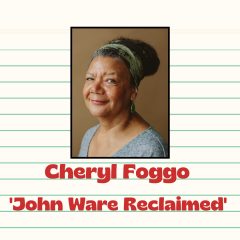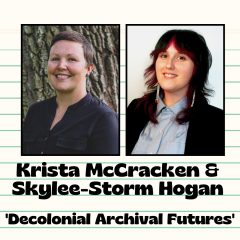Keynote Announcement! We are honoured to welcome these presenters to the Underhill Colloquium 2022:

Opening Keynote
Opening Keynote – Cheryl Foggo, ‘John Ware Reclaimed’ Author, filmmaker and playwright Cheryl Foggo shares the challenges she has encountered in her excavations of western Canada’s Black history. Through images and examples she offers her perspective on rethinking the ways we preserve, examine and disseminate our stories.
Cheryl Foggo is a multiple award winning playwright, author and filmmaker, whose work over the last 30 years has focused on the lives of Western Canadians of African descent. Recent works include the release of her NFB feature documentary John Ware Reclaimed, available on nfb.ca, as well as the 30th anniversary edition of her book Pourin’ Down Rain: A Black Woman Claims Her Place in the Canadian West. She has multiple projects upcoming in 2022, including a production of her play Heaven at Lunchbox Theatre in Calgary in June 2022, and a production of her play John Ware Reclaimed at the Blyth Festival in Sept 2022. Cheryl is the recipient of the Lieutenant Governor of Alberta Outstanding Artist Award, The Doug and Lois Mitchell Outstanding Calgary Artist Award and the Arts, Media and Entertainment Award from the Calgary Black Chambers, all in 2021.
_________________________________________________

Closing Keynote
Closing Keynote – Krista McCracken and Skylee-Storm Hogan-Stacey, ‘Decolonial Archival Futures: Reflections and Practice’ Researchers, historians, and archivists can reframe and better analyse historical narratives in settler states through meaningful partnerships with Indigenous communities and knowledge keepers. Much of the work taken on by Krista McCracken and Skylee-Storm Hogan has been a reimagination of archival structures and a practical community-based approach to their archival and historical practises. From discussions of ownership and access, to ceremonial care in the archives, Hogan and McCracken have explored meaningful alternatives to settler-colonial archival systems that impact all levels of historical and educational scholarship. By examining archival practises that push against and actively counter settler colonialism, this talk will challenge non-Indigenous practitioners to consider constructs of knowledge, which histories we tell, and how we present the past.
Krista McCracken (they/them) is an award winning public historian and archivist. They work as a Researcher/Curator at the Shingwauk Residential Schools Centre, in Baawating (Sault Ste. Marie, Ontario) on the traditional territory of the Anishinaabe and Métis people. Krista’s research focuses on community archives, Residential Schools, access, and outreach. They have two ongoing book projects, Decolonial Archival Futures with Skylee-Storm Hogan-Stacey and Trans and Gender Diverse Voices in Libraries with Kalani Adolpho and Stephen Krueger.
Skylee-Storm Hogan-Stacey (they/them) is an emerging Indigenous public historian whose research focuses on Indigenous archival practice, residential schools, and Kahnawá:ke history. During their time with Know History’s Ottawa office, Skylee-Storm has worked on projects large and small, including oral history and documentary film, with a particular focus on Indigenous clients. After working with the Shingwauk Residential Schools Centre, Skylee-Storm has become an advocate for critiquing power dynamics in heritage and settler Canadian historical narratives. Their forthcoming book with Krista McCracken, Decolonial Archival Futures, continues this work.
_________________________________________________
The Underhill Graduate Student Colloquium 2022 is made possible by the generous contribution of the Frank H. Underhill fund, with keynote support from the School of Indigenous and Canadian Studies, Migration and Diaspora Studies, and Film Studies at Carleton University.
_________________________________________________
We wish to acknowledge that this Colloquium (and Carleton itself) takes place on the traditional and unceded territory of the Algonquin Anishinaabek/ Omàmiwininiwag. While the conference is virtual, their presence here since time immemorial must be acknowledged.